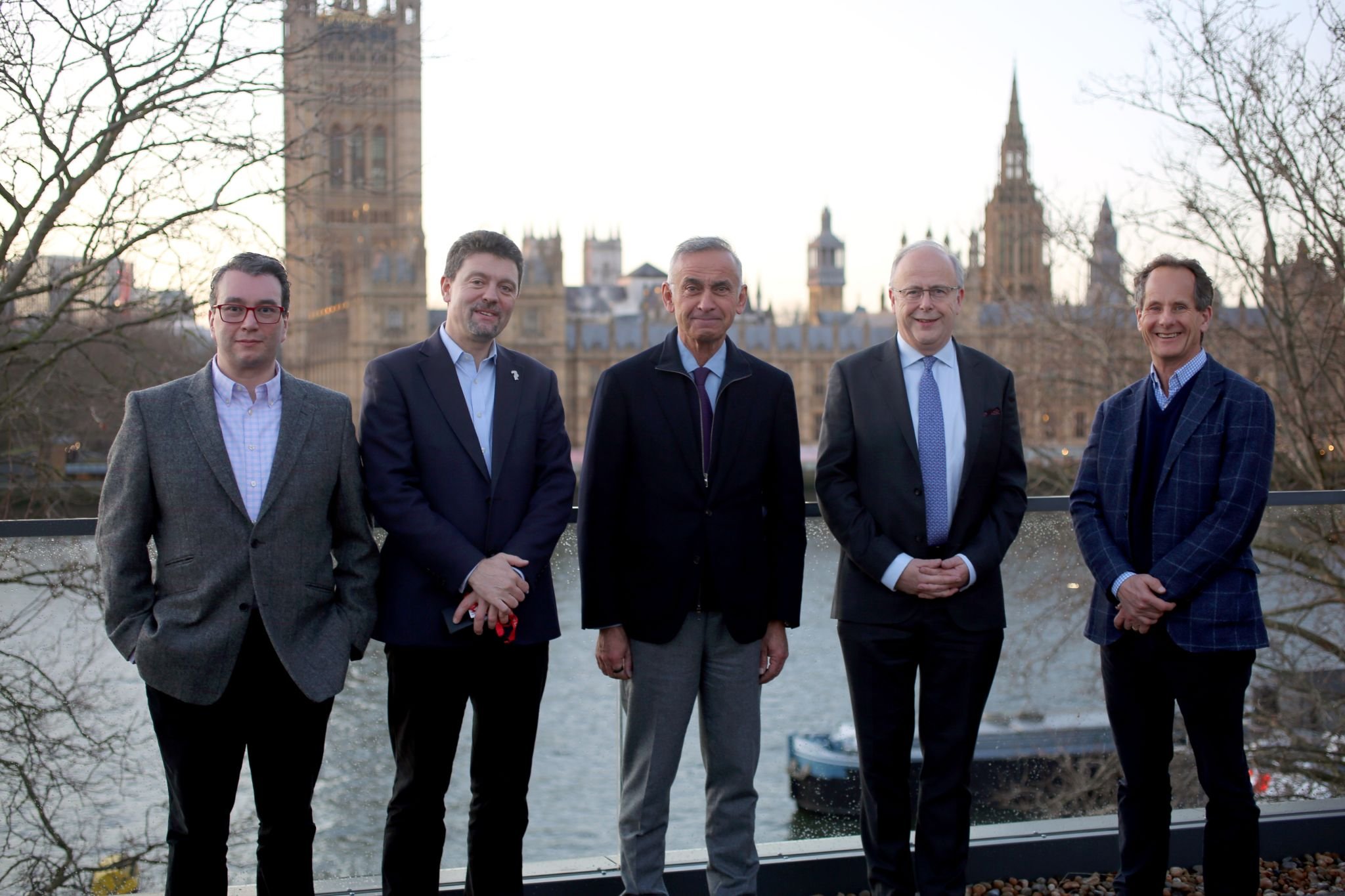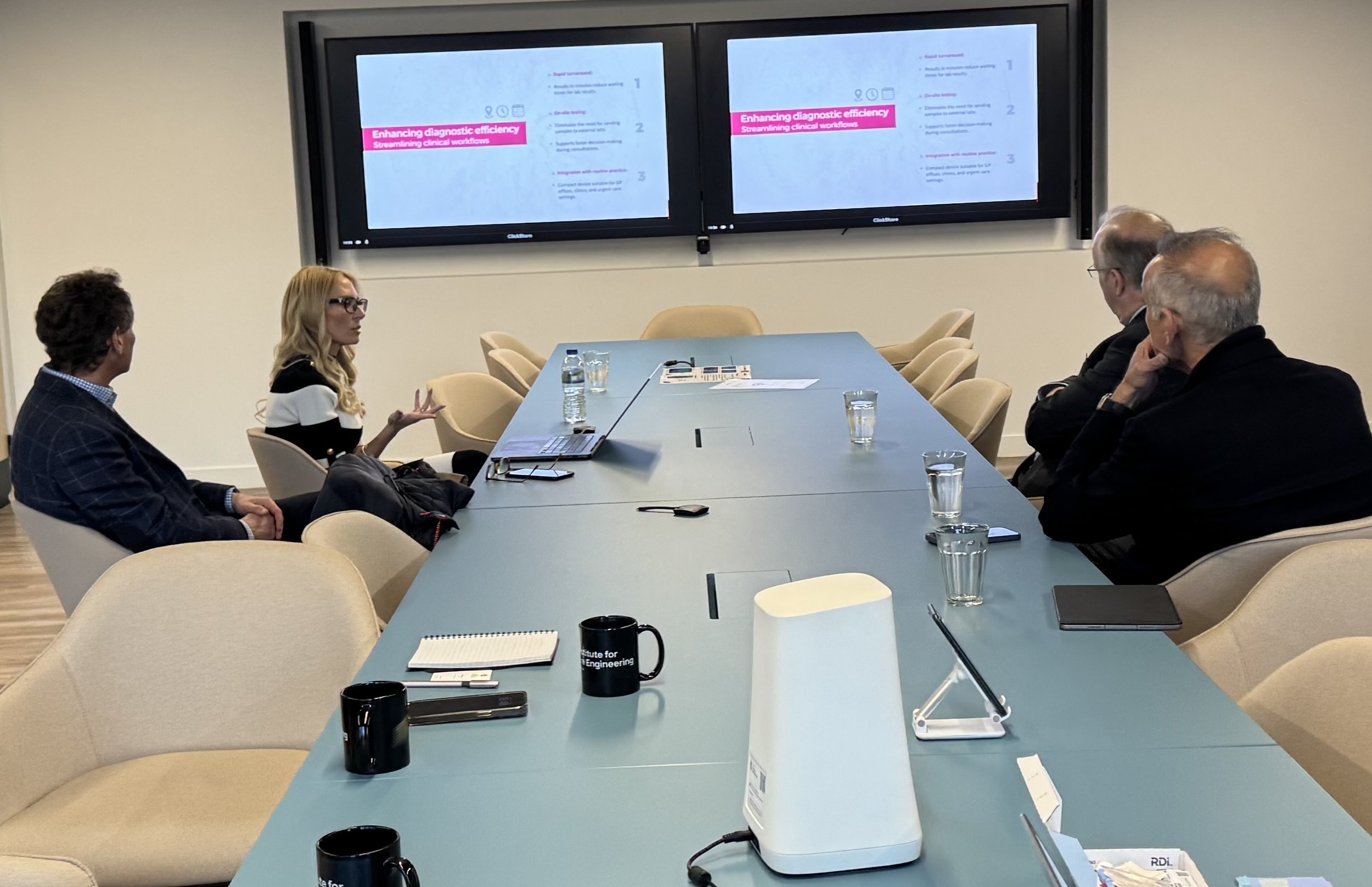Lord Darzi Team Visit OIA to Discuss the Potential of Algocyte to Solve a Human Health Challenge
From left to right: Dr. Hector Zenil, Founder of OIA and Associate Professor at King’s College London; Professor Sebastian Ourselin, Director of LIHE and Head of the School of Biomedical Engineering and Imaging Sciences; Lord Darzi; Professor Tim Orchard; and Hugo Phillips, COO of OIA. The photo was taken on the balcony of the London Institute for Healthcare Engineering (LIHE), with the Thames River and the British Parliament in the background.
We were honoured to host Professor the Lord Darzi OM KBE PC FRS, Executive Chair of the Fleming Initiative, and Professor Tim Orchard, CEO of Imperial College Healthcare NHS Trust, at the London Institute for Healthcare Engineering (LIHE), OIA’s new branch office in London for an engaging discussion about Algocyte®.
Algocyte, developed by Oxford Immune Algorithmics®, is an end-to-end solution that aims to enhance diagnostic accuracy through personalised blood-test analysis. Unlike traditional methods that compare test results to average population ranges, Algocyte identifies an individual’s unique baseline values over time. By monitoring changes in these personalised baselines, the technology can detect early signs of disease and potential health risks in a pipeline of sophisticated proprietary AI algorithms developed by OIA for precision healthcare.
The discussion centred around Algocyte’s potential to help address the global challenge of antimicrobial resistance (AMR), a critical threat to global health.
The Challenge of Antimicrobial Resistance
Antimicrobial resistance (AMR) is when microorganisms, like bacteria, viruses, fungi, and parasites, no longer respond to antimicrobial medicines due to their misuse and abuse. This makes infections harder to treat and increases the risk of spreading disease.
A study in The Lancet showed that more than one million people died from antimicrobial resistance (AMR) globally each year between 1990 and 2021. And it had a dire prediction, that deaths are set to increase by 70% by 2050 compared to 2022. A study from Nuffield Oxford forecasts a 67.5% increase in annual deaths directly attributed to bacterial AMR, rising from 1.14 million in 2021 to an estimated 1.91 million in 2050. Deaths associated with AMR are also expected to increase by 74.5%, from 4.71 million in 2021, to 8.22 million deaths in 2050.
The Fleming Initiative, led by Lord Darzi, is dedicated to safeguarding populations worldwide from AMR by translating innovation into practice through science, public engagement, behavioural change, and policy measures. Against this backdrop, the visit provided a perfect opportunity to showcase how Algocyte aligns with these goals.
Impressions and Insights from the Visit
Lord Darzi and Professor Orchard were impressed by the potential of Algocyte and the remarkable technology behind it. While its primary focus is on combating AMR, they noted the versatility of the device and the AI platform that powers it. This flexibility positions Algocyte to contribute not only to tackling AMR but also to transforming other healthcare pathways.
The platform's ability to enable preventative and precision healthcare was particularly highlighted. By leveraging advanced AI capabilities, Algocyte can provide accurate and early diagnostics, offering opportunities to detect, monitor, and manage diseases more effectively. This innovation aligns with the evolving focus of healthcare systems worldwide—shifting from reactive care to proactive, patient-centred solutions.
Advancing Personalised Diagnostics
Algocyte’s precise and personalised approach to healthcare and medicine addresses a critical gap in current medical diagnostics, where generalised reference intervals overlook important individual variations proven to be biologically and clinically relevant. Algocyte marks a shift away from traditional methods that compare blood-test results to population averages.
Instead, Algocyte employs a personalised approach: it tracks an individual’s blood-test data over time and utilises its proprietary AI to generate tailored disease hypotheses and eventually a Digital Blood Twin on which clinicians can review simulate interventions for diagnostic and preventive purposes.
A Step Towards Transforming Global Healthcare
The visit reaffirmed the importance of fostering collaborations between academia, healthcare providers, and policy-driven initiatives like the Fleming Initiative and the London Institute for Healthcare Engineering. Such partnerships are essential to bridge the gap between innovation and real-world application, especially in addressing challenges as significant as AMR.
We are deeply grateful to Lord Darzi and Professor Orchard for their valuable insights and support and remain committed to advancing the mission of delivering impactful, AI-driven innovations in healthcare.
Dr. Hector Zenil, Founder of OIA and Associate Professor at KCL
Oxford Immune Algorithmics is a deep-tech start-up incubated and co-developed by the UK Golden Triangle universities (Oxford, Cambridge, and KCL) that applies a form of Superintelligence (causal predictive & generative AI) based on symbolic regression and program synthesis as opposed to simple pattern-matching to deliver precision healthcare and predictive medicine at scale.



